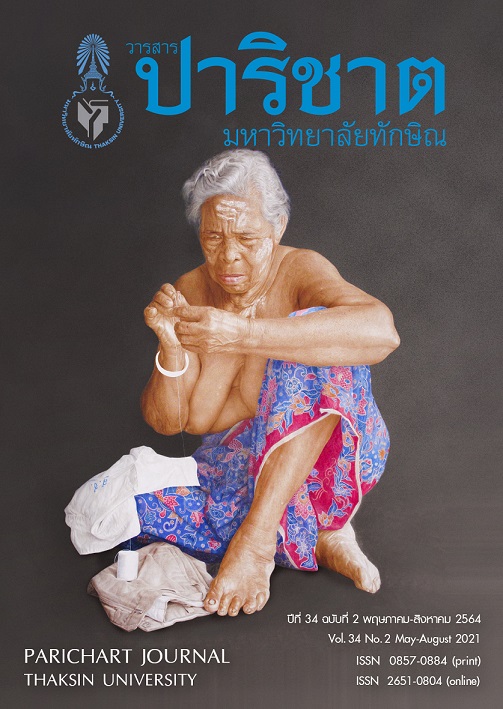Religious and Ethnic Adaptations of Malay-Muslim Students at Prince of Songkhla University, Surat Thani Campus
Main Article Content
Abstract
The study was to examine religious and ethnic adaptations of Malay-Muslim students from Thailand’s deep south who furthered their studies at Prince of Songkhla University, Surat Thani Campus, presenting data on the religious and ethnic identity of the students who possessed the educational opportunity but the educational institution itself might not be understanding and aware of such identity. The study was conducted with 16 young people aged 18 to 24, using qualitative research with a focus group discussion being applied. A participatory observation was also employed every time in the group discussion. The objectives of the study were to build trust and to study the level of such adaptation towards the challenges in terms of different religions and ethnics which included 1) a spiritual ceremony of paying homage to teachers, 2) freshmen welcoming, 3) Hijab wearing, and 4) Halal food. Here, the theory of a Cultural--Ethnic Identity Typological Model was applied. The results of this study showed 3 stages of their adaptation. In Stage 1, they considerably attached themselves to their ethnic identity and rarely embraced a new culture. In Stage 2, they started adapting themselves to maintain their identity while also embracing the new culture. In Stage 3, they felt they were part of the new culture. This was challenging for Thai Muslim students and Thai society which would become a multicultural society where people could peacefully live together.
Article Details
References
Yaping, G., & Song, C. (2007). The Relationships of Cross-Cultural Adjustment with Dispositional Learning Orientation and Goal Setting: A Longitudinal Analysis. Journal of Cross-Cultural Psychology, 38, 19-25.
Leader of Muslim Club, Prince of Songkla University Surat Thani Campus.(Interviewee), Pengjan, S. (Interviewer), Address: Prince of Songkla University Surat Thani Campus, Moo 6, Makhamtia District, Surat Thani Province. 2018, 10 July. (in Thai)
Muslim Hot Report. (n.d.). Why Can’t Muslims Participate in the Ritual of Paying Respect to the Teachers?. Retrieved on March 3, 2019, from https://muslimhotreport.blogspot.com/2011/08/blog-post.html#more. (in Thai)
Thai Muslim post. (2017). Know..Why Can’t Muslims Accept Younger Siblings?. Retrieved on March 3, 2019, from: http://islamhouse.muslimthaipost.com/main/index.php?page=sub&category=9&id=20764.
Samplings (Interviewee), Pengjan, S. (Interviewer), Address: 31 Moo 6, Markham Tia, Muang Country, Surat Thani Province. March 18, 2019. (In Thai)
Women of the way. (n.d.). Hijab is?. Retrieved on March 3, 2019, from https://sites.google.com/site/banatulhuda2/hijab_is.
Berry, John W., Kim, U., Minde, T., & Mok, D. (1987). Comparative Studies of Acculturative Stress. International Migration Review, 21(3), 491.
Mudhovozi, P. (2012). Social and Academic Adjustment of First-Year University Students. Journal of Social Science, 33(2), 251-259.
Diamond, JM. (2000). Taiwan’s Gift to the World. In Nature, 403(6771), 709–710.
Khewtep, K. (2009). Analysis of Media, Concepts and Techniques. Bangkok: Chulalongkorn University Book Center. (In Thai)
Henya, K., & Jo, C. (2006). Cultural Adjustment of International Students. Journal of Psychological Science, 2(1), 133-137.
Larzarus, R. S., & Folkman, S. (1984). Stress, Appraisal and Coping. New York: pringer Publishing.
Roy, C., & Andrews, Ha. (1999). Roy Adaptation Model. Stanford, CT: Appleton & Lange.
Monlada, Y. (2013). The Effect of Group counseling based on truth theory on cultural adaptation of first year undergraduate Muslim students, Thaksin University. Songkhla Campus. Master’s Thesis. Songkhla: Thaksin University. (in Thai)
Rimpeng., L. (2008). Ethical Factors of Muslim Students in Higher Educational Institute. Requirements Master’s Thesis. Pattani : Prince of Songkla University.
David, Maya Kh., & Wendy Y, M. T. (2010). Perceptions of Ethnic Otherness: A Study of Malaysian Children. In Maya Khemlani David, James McLellan, Ngeow Yeok Meng : USA.
Traitongyoo, K. (2008). The Management of Irregular Migration in Thailand: Thainess, Identity and Citizenship. Doctor’s Thesis. UK: University of Leeds.
Pithsuwan, W. (2005). Factors Affecting Importance of Halal Certification by Muslim Consumers in Buying Food Products: A Case Study of Thai Muslims in the Four Southern Border Provinces. Journal BU Academic Review, 4(1), 72-83.
Jitpiromrsi, S., & Duncan Mc. (2008). A Ministry for the South: New Governance Proposals for Thailand’s Southern Region. Contemporary Southeast Asia, 30(3), 403-428.
Khewtep, K. (2009). Analysis of media, concepts, and techniques. Bangkok: Chulalongkorn University Book Center. (In Thai)
Fuengfusakul, A. (2003). Identityy, Theory Review and the Conceptual Framework. Bangkok : The National Research Council of Thailand. (in Thai)


